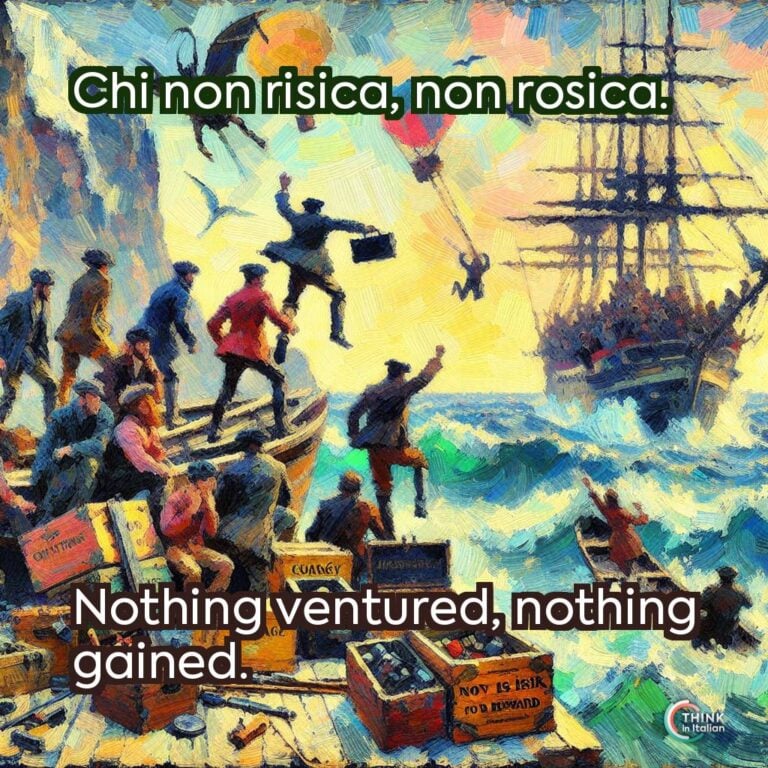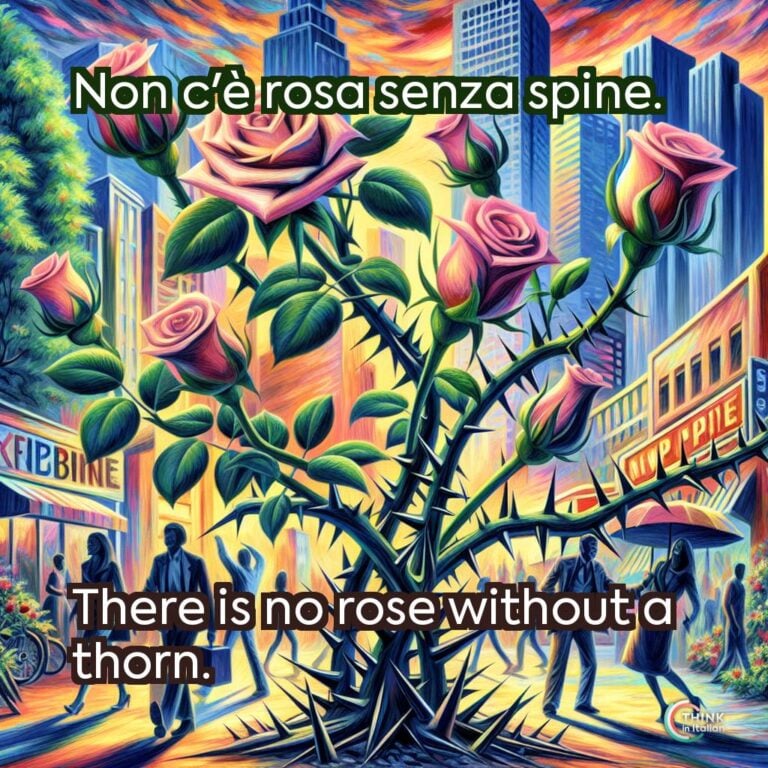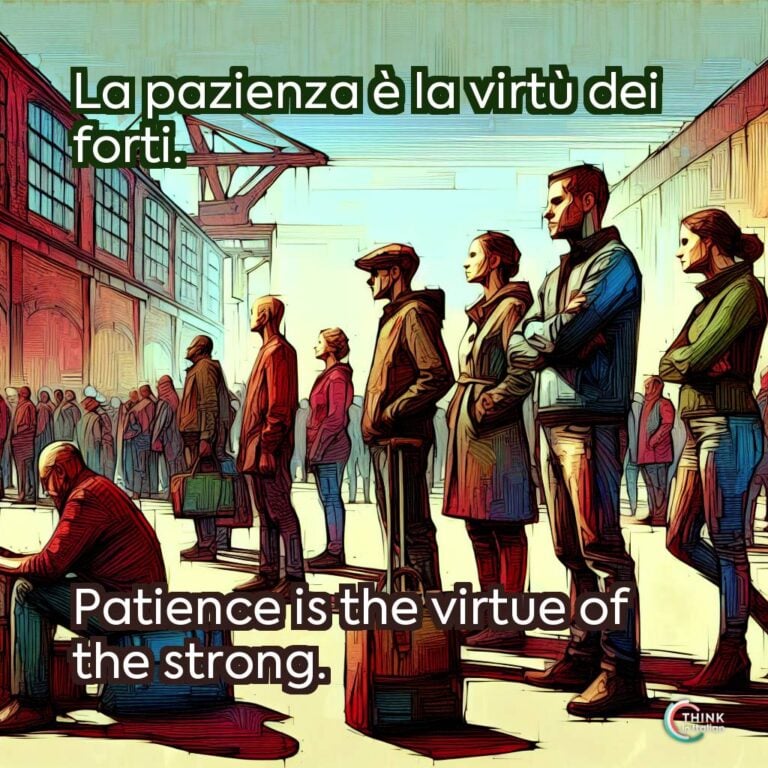Download 15 beautiful images of Italian inspirational quotes
Share your feelings with your loved ones with Italian quotes!
I collected 5 Italian inspirational quotes in 3 formats (desktop, mobile, social) for you to share with friends or set as your desktop or mobile background images.
Where should I send them?
Receive a quote a day over the next 5 days plus a wealth of free useful resources. Opt out at any time.
Just submit this form to receive the images in your mailbox.
The Cultural Value of Italian Proverbs
Italian proverbs aren’t just simple sayings, they’re a rich expression of Italy’s cultural wisdom, reflecting the unique perspective Italians have on life, love, family, and community.
For me, when it comes to learning a language, idioms and expressions are the most engaging and fun part of the process. But you really need to understand the cultural references behind them, as they often have no English equivalent.
Often, Italians use proverbs to express advice, humor, or life lessons indirectly and respectfully, which is highly valued in Italian conversations.
I myself use proverbs in daily conversation as they allow to convey truths or advice in a nuanced, fun, yet straightforward way. Many famous Italian authors have also used proverbs in their writings, making them a lasting part of Italian culture and literature.
To better appreciate the depth of Italian wisdom, I grouped proverbs into themes. This way, you can use them in the right context and bring a bit of Italian culture into everyday conversations.
Italian Proverbs
Italian Proverbs About Love
L’amore è cieco.
Love is blind.
This timeless proverb emphasizes the belief that love overlooks imperfections, showing how Italians view love as something that transcends reason and judgment.
L’amore vince sempre.
Love conquers all.
Italy’s dedication to romance is exemplified here, showing love as an enduring, powerful force.
Amor non conosce travaglio.
Love never tires. (Lit: love knows no labor)
This proverb reflects the Italian view that true love doesn’t feel burdensome, no matter the effort involved. When people are motivated by love, they’re willing to go to great lengths without feeling exhausted.
Amor tutti fa uguali.
Love makes all men equal.
This saying suggests that love is universal: no matter one’s social status, wealth, or power, love brings everyone to the same emotional level.
In Italian culture, this phrase captures the belief that love transcends all differences, placing everyone on equal footing in the pursuit of happiness and connection.
Italian Proverbs About Life
Chi dorme non piglia pesci.
You snooze, you lose / Early bird catches the worm. (Lit: those who sleep don’t catch any fish)
This proverb stresses the importance of seizing opportunities, a value Italians believe is essential for success.
Quando finisce la partita il re ed il pedone finiscono nella stessa scatola.
When you finish the game, the king and pawn end up in the same box.
This phrase reminds us of life’s humility; in the end, everyone is equal, whether rich or poor.
A caval donato non si guarda in bocca.
Never look a gift horse in the mouth.
This proverb means you shouldn’t scrutinize a gift or be critical of its value. Instead, accept it with gratitude, recognizing the kindness of the gesture rather than focusing on its flaws.
Il dolce far niente.
It is sweet to do nothing.
This phrase expresses the Italian appreciation for the art of relaxation and savoring life’s simple moments. It celebrates the well known Italian dolce vita, the joy of enjoying life just as it is.
La vita è un sogno.
Life is a dream.
This saying reflects the Italian appreciation for embracing life’s beauty and impermanence, as well as a philosophical view that life, like dreams, is to be enjoyed and not overly controlled.
Una cena senza vino è come un giorno senza sole.
A meal without wine is a day without sunshine.
Mangia bene, ridi spesso, ama molto.
Eat well, laugh often, love much.
These two proverb embody the Italian priorities of good food, joy, and meaningful relationships. They serve as a reminder to live fully and focus on the things that bring happiness and fulfillment.
Un bel morir tutta la vita onora.
A noble death is an honor to the whole life.
This saying reflects the idea that living a life of integrity and courage leaves a lasting legacy, even in death. Italians value the concept of a life well-lived, and a dignified end is seen as a crowning honor to one’s entire life.
Vedi Napoli e poi muori.
See Naples, and then die!
This phrase celebrates Naples as one of the most beautiful, culturally rich places, and I totally agree! It makes the concept extreme by suggesting that after experiencing its wonders, one could feel completely fulfilled, and even die.
Finchè c’è vita c’è speranza.
Where there’s life, there’s hope.
Uomo avvisato, mezzo salvato.
Forewarned is forearmed. (Lit: Warned man, half saved)
A mali estremi, mali rimedi.
For severe ills, severe remedies.
This proverb means that in extreme situations, drastic actions are sometimes necessary. It is often used to justify bold actions taken in difficult circumstances.
Vivi e lascia vivere.
Live and let live.
Quel ch’è fatto, è fatto.
What is done is done.
Tempo al tempo.
All in good time.
Tutte le strade portano a Roma.
All roads lead to Rome.
This phrase originates in ancient Rome, where all major roads were said to lead to the capital. It means that no matter which path you take, you’ll eventually arrive at your destination, reflecting the idea that there isn’t only one correct way to succeed in life.
Tutto è bene ciò che finisce bene.
All is well that ends well.
Meglio tardi che mai.
Better late than never.
L’abito non fa il monaco.
The cowl does not make the monk.
This proverb means that appearances can be deceiving: a person’s look doesn’t necessarily reflect their true character. Italians use this saying to remind others not to judge people by their looks, as true qualities lie deeper than what’s visible on the surface.
La calma è la virtù dei forti.
The calm is the virtue of the strong.
Italian Proverbs About Family and Friends
La famiglia è la patria del cuore.
Family is the heartland of your heart.
This phrase reflects the Italian view of family as a core part of one’s identity and emotional well-being.
Quando l’amico chiede, non v’è domani.
When a friend asks, there is no tomorrow.
Italians place high value on friendship and loyalty, viewing friends as extended family who deserve immediate help and attention.
Mal comune, mezzo gaudio.
A shared trouble is half joy.
This means that when people face a difficult situation together, the burden feels lighter, reminding that one isn’t alone in their struggles. For Italians, sharing challenges brings a sense of solidarity and they appreciate the community and collectiveness.
Chi trova un amico trova un tesoro.
Who finds a friend finds a treasure.
This proverb makes a metaphorical use of the word tesoro to express that real friendship is one of the most valuable aspects of life.
Italian Proverbs About Work and Perseverance
Aiutati che Dio t’aiuta.
Help yourself and God will help you.
This proverb means that those who act on their own behalf are more likely to succeed.
Ride bene chi ride ultimo.
Who laughs as last, laughs the longest.
This means that true satisfaction comes at the end and that patience and perseverance pay off. Also, it implies that premature celebration can lead to an ironic reversal, where the final outcome reveals the true winner.
O la va, o la spacca.
All or nothing.
O la va o la spacca conveys a spirit of determination and risk-taking. It means going into something with full commitment, accepting that it will either succeed spectacularly or fail completely.
Chi fa da sé, fa per tre.
Do it yourself if you want it done right. (Lit: who does it by itself does it for three people)
Chi non fa, non sbaglia.
Those who do nothing make no mistakes.
This phrase suggests that avoiding actions may prevent errors, but it also means missing opportunities for growth. It implies that mistakes are a natural part of taking actions, and encourages taking initiative.
Meglio tardi che mai.
Better late than never.
Italian Proverbs With Nature and Animals
Rosso di sera, bel tempo si spera.
When the sky is red, hopefully the weather will be nice. (Lit: red in the evening, one hopes for good weather)
Italians often look to nature for signs and guidance, showing their deep connection with the land and natural world.
Il lupo perde il pelo ma non il vizio.
The wolf loses the fur but not the vice.
As simple as it is, this proverb means that people rarely change their true nature, even if they seem different on the outside.
Meglio un uovo oggi che una gallina domani.
A bird in the hand is worth two in the bush. (Lit: better an egg today than a hen tomorrow)
Non c’è rosa senza spine.
There is no rose without thorns.
This means that beautiful things often come with challenges or difficulties. It reminds us that pleasures often come with struggles or risks and that sometimes it is good to accept imperfections as a natural part of attaining something worthwhile.
Chi dorme non piglia pesci.
Those who sleep don’t catch any fish.
Tra il dire e il fare c’è di mezzo il mare.
Easier said than done. (Lit: there’s a sea between saying and doing)
Meglio un giorno da leone che cento da pecora.
Better to be a leader than a follower. (Lit: better one day as a lion than a hundred as a sheep.
This phrase celebrates bravery over a life of timidity. It suggests that a single day lived with courage is more valuable than a long life spent in fear or passivity. It encourages a fearless, authentic approach to life.
Non cercare il pelo nell’uovo.
Don’t nitpick. (Lit: do not look for the hair in the egg).
It suggests avoiding unnecessary fault-finding. A nitpicker is a person who spots a very hidden flaw or a detail that is often not even visible. Rather, focus on the bigger picture.
How to Use These Proverbs
With this list of Italian proverbs, you can show off your wisdom and cultural knowledge in your next conversation with a native speaker. Here are some advice to integrate these proverbs naturally:
- Express a life lesson or give advice: Italian proverbs often provide thoughtful life advice. I use them when I want to give advice in a warm, relatable way.
- Add humor to conversations: Italian have a great sense of humor. These proverbs are witty and insightful, perfect for lightening the mood or making a humorous point.
- Inspire and motivate: some proverbs are inherently motivational, great for giving a boost to friends or family members who might need encouragement.
- Reflect on Italian culture: share these proverbs when discussing Italian customs, like Italy’s appreciation for food, family, and community.






